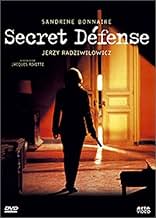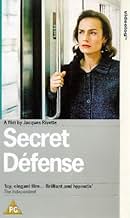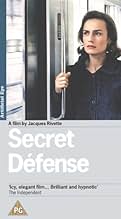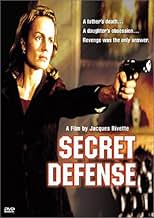Sylvie, une scientifique de trente ans, doit creuser de plus en plus profondément son propre parcours.Sylvie, une scientifique de trente ans, doit creuser de plus en plus profondément son propre parcours.Sylvie, une scientifique de trente ans, doit creuser de plus en plus profondément son propre parcours.
- Prix
- 1 nomination au total
Mick Gondouin
- Extra
- (uncredited)
Histoire
Le saviez-vous
- AnecdotesIn this film, Jacques Rivette merges his usual style with that of Claude Chabrol, both in terms of plot, editing and soundtrack
- ConnexionsFeatures Brigands, chapitre VII (1996)
- Bandes originalesDi perra mora
Music by Pedro Guerrero
Performed by Hespèrion XXI (as Hesperion XX)
Conducted by Jordi Savall
(P) Auvidis-France
extrait de "El cancionero de Medinaceli"
(CD Auvidis-Fontalis E 8764)
Commentaire en vedette
This is a spectacularly successful mystery film by director Jacques Rivette, who also collaborated on the screenplay. His films always contain long, lingering shots and scenes that seem to go on forever. Sometimes this can be so irritating one wants to scream. For instance, I tried three times to watch his LA BELLE NOISEUSE (1991) and gave up in exasperation each time because it was so boring, so enormously long, and like a vanity exercise. One would therefore think that the last person to make a successful thriller would be Rivette, with his slow pace. But incredibly, with this film, his snail's pace works perfectly and turns the film into a masterpiece. This would have been impossible without the genius actress Sandrine Bonnaire, who plays the lead and monopolizes the screen with complete success. Bonnaire made it clear to the world that she was at a higher level than most actresses in 1985 when she starred in Agnes Varda's extraordinary and searing film, VAGABOND (SANS TOI NI LOI). She is so quiet and meditative that she sucks the audience into the vortex of her thoughts, and carries us right along with her as she swirls with silent, unarticulated torment. She showed this again in the amazing L'EMPREINTE DE L'ANGE (MARK OF AN ANGEL aka ANGEL OF MINE, 2008, see my review). She really is one of the most intense and powerful actresses in the world today. In this film, she plays a cold, introverted, determined woman who has withdrawn into herself and is unable to return affection without the greatest of difficulty. The man who is constantly courting her and assuring her of his feelings is barely noticed by her, so absorbed is she in her own issues, and preoccupied by what is troubling her. 'Secret défense' is the French expression corresponding to 'official secret' in English. It is not necessarily a reference to military defence (British) or military defense (USA). Although Bonnaire's deceased father had been the head of France's largest defence contractor, succeeded by the mysterious figure of Walser, played with appropriate ambiguity by Polish actor Jerzy Radziwilowicz (which by the way means 'son of Radziwil' in Polish), who is so well known to cinema lovers from Andrezj Wajda's classic films MAN OF MARBLE (1977) and MAN OF IRON (1981), these hints of military secrecy flicker in the background like the reflections on a wall in an indoor swimming pool, but never come into focus. This all helps to create the air of menace and conspiracy which pervades this film, and which expresses the French attitude towards the worlds of officialdom, money and power. This film is primarily one of slow realization of what had previously seemed inconceivable to the normal and innocent mind. Bonnaire is brilliant at slowly coming to these realizations before our eyes, in the lingering shots where there is nothing between her face and us but her thoughts. How easily this film could have failed miserably! But she and Rivette together pull it off, almost as a miracle. I was on the edge of my seat for each and every prolonged scene, and never lost patience. The slow pace merely serves to heighten and intensify the unbearable suspense. Somehow Rivette knew the exact instant to cut. As soon as a scene has served its purpose, and been squeezed of the last of its juice, it skin is thrown into the bucket and we reach for the next fruit. I watched this film twice because I wanted to be sure. Yes, it really is a masterpiece of filmmaking. The music at the beginning and the end is viola da gamba music played by Jordi Savall (one of the world's two best gamba players, the other being the younger Paolo Pandolfo). The film's inherent ambiguity and theme of double-appearances is intensified by the acting of the amazing Laure Marsac, who plays identical twin sisters. Both of them are in a perpetual state of volatile and wavering uncertainty. After Bonnaire is informed by her younger brother that he has found evidence that their father had been murdered five years before, and that he was pushed from a train by someone, and did not jump and commit suicide as officially recorded, she receives a curious visit from Marsac, who is Walser's secretary and lover. This is one of the most ambiguous scenes in the film, in which nothing which is intended to be said is actually said by Marsac, and she reluctantly leaves without having made her purpose clear at all. The air of mystery is continually heightened by such devices of the story. Guns are continually being taken out of pockets and put into drawers or desks, and we don't know where they keep coming from. We are constantly aware that they are there, and could be removed and used by one of the many increasingly desperate people in this story. Then one of the twin sisters disappears and suddenly she is seen again by the shocked characters in the story, only to be revealed as the unknown twin whom they had not realized existed. She moves into the country mansion known as 'the Domaine' and assumes the role of her vanished sister. Meanwhile, Bonnaire's desperate younger brother is charging around on his motorbike with his gun, threatening to kill Walser, who he says killed his father in order to take over his company. A photo has mysteriously appeared, we are never told from where, showing Walser with his father on the train platform on the morning of the father's death, contradicting Walser's supposed alibi that he was elsewhere at the time. This film has two parallel stories, like two parallel universes, the false and the true. At how many points do these intersect? And how can truth be separated from illusion in this double world where it is not only sisters who are twins, but events themselves which exist in two forms and which bear an ambiguous and double interpretation?
- robert-temple-1
- 19 mai 2013
- Lien permanent
Meilleurs choix
Connectez-vous pour évaluer et surveiller les recommandations personnalisées
- How long is Secret Defense?Propulsé par Alexa
Détails
Contribuer à cette page
Suggérer une modification ou ajouter du contenu manquant

Lacune principale
By what name was Secret défense (1998) officially released in India in English?
Répondre






















